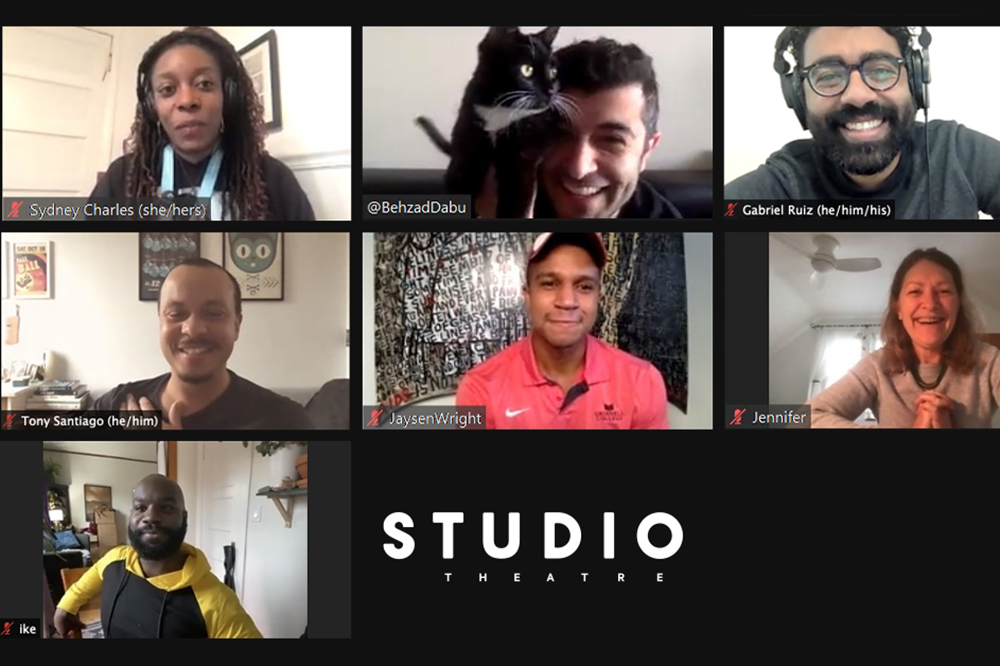Culture
 Zoom recording session. Photo courtesy of Studio Theatre.
Zoom recording session. Photo courtesy of Studio Theatre.
Ike Holter Distills 2020 into Album in “I Hate It Here”
December 17, 2020 @ 5:51pm
The most crushing and exhilarating track of Ike Holter’s “I Hate It Here: Stories from the End of the Old World“ begins about 30 minutes in. The all-audio production, released on Studio Theatre’s website on December 10, drops us on a hill overlooking a wedding party during the pandemic where two people, Lisa and Thomas, are discussing a lot.
That makes sense. A lot has happened in 2020, and we’re still two weeks out from its completion. The two characters begin the conversation with a few observational jokes: one about how Thomas is the only Black person at the wedding and another about how there’s also a Jewish attendee, and how that’s essentially the same thing when observing the wedding guest list. Lisa says her joke, and Thomas laughs along, before she exclaims, “I’m going to hell.” Thomas assures her the “joke” won’t send her below. Actions send people to hell, not words.
Lisa sighs with relief and Thomas gives examples of actions he’d consider “hellable.” The police who shot a boy in California, for instance: hellable. Lisa agrees, and you can hear the character nodding her head uncomfortably fast in an attempt to appear as a staunch white ally. Then the conversation turns to a different instance of police brutality, one where we discover how front-facing allyship means nothing if it’s merely a façade, a cover up for inaction. For her own inaction, we learn, Lisa is going to hell.
Holter’s audio play is filled with vignettes and scenarios similar to the uncomfortable revelations of Lisa and Thomas. There’s a British mother who calls her son, a woman who’s lost family members and her dog to the virus, and a character who ponders what music he should play when the bomb hits and the world ends.
“This piece is a lot more like an album,” Holter says. “We don’t have one protagonist. We have over a dozen themes, monologues, and songs and stories that take you through what the feeling is when everything changes.”
Looking back on 2020, it’s easy to see how a piece about change will resonate. Even the idea of an “audio play” fits this theme. Before March, people would file into Studio Theatre, where they’d see these stories unfold before them. Now, instead of walking through the glass doors on 14th Street, Studio is asking audiences to click here and hit play. Instead of stage design, intricate costumes and finely tuned lighting with perfect white balance, you’ll get impeccable sound design and incredible voice work. And while there’s no visual cues or complements for the performance, we can see exactly who these characters are in our own lives.
“These are stories about people standing up,” he says. “It takes us through the year without being on the nose. Any person could hear it and know it’s modern and what it’s about. But it’s looking at people. There’s funny, weird stuff. It works on a human level.”
With the release of the “album” at Studio Theatre, we were able to catch up with Holter about writing for audio, how he recorded the actors and why an audio production is a perfect encapsulation of 2020 theater.
District Fray: Did you always have an interest in working on an audio production?
Yeah, I would listen to “A Prairie Home Companion” with my family. The first audio play I did was the one Studio commissioned in 2015, but never completed. I eventually recorded it, and it’s been streamed by more people than [those] who saw the live productions. [Audio] is a powerful element of storytelling, and it’s not hard to get people to listen to something. It’s been a very interesting Wild Wild West game. This is how we’re doing storytelling for a while, and it’s been great to talk to sound designers [and] people who understand the medium.
I imagine writing for this was a great deal different than writing for a visual medium. What adjustments did you keep in mind, and what kinds of things did you feel would carry over from your playwriting and television writing?
The way you build out the scene is interesting. I’ll add lines, verbiage for what is happening in a not on the nose way. I take it as a painting that should be animated, or a film. The process of making a painting move is animating it, and it’s so textured. If there’s an action scene, you need rewrites. [If] someone walks up a hill, lights a cigarette and talks to themselves, you need to hear that. Our sound designer and the audience need to know what’s happening.
What was the creative process and how did it differ for you?
It is track to track. It’s all prerecorded. I think we’re all going through what theater means: where there’s elements of stage being used, but if someone doesn’t know it, they’re picking up an album. If they’re watching a Zoom play, it’s just a movie with close-ups. I think of [this play] as an album.
“An album” is used to describe this performance a lot.
As someone who grew up on Lauryn Hill’s “Miseducation,” there were classroom scenes before the songs. They have these intros and outros, and I’m using this [style] with some of these monologues. We’re using album logic. The cool thing with this is that they’re not listening to 10 scenes. There’s only two “sit-down” scenes where they’re having a catharsis in 10 minutes. You’re following a new character’s voice and before there’s a conclusion, you get a lot of ideas.
For the performances, you had the actors turn their screens off so you wouldn’t see them. Can you talk a little about why you chose to direct them this way?
The first thing I was really excited to do was not see the actor. So much of the rehearsal process is how they look in their outfit [and] how they’re moving, so we turned the cameras off and went right into it. Listeners can tell when they’re not in the same room or if they’re not in the same room at the same time. From [an] acting perspective, so much of it is storytelling through monologue. I used the film method, where you come prepared and [don’t] lay it down once. We’ll record every day, basically, and try it 20 different times. We never even did a full read. We’re treating this like [it’s] not a play.
How do you think audiences will and are, so far, reacting to these different interpretations of what theater is?
It’s the job of the audience. We make sense of whatever we see. Theater tells students to do things in a different way. This has a kaleidoscopic theme. It’s 2020 and it’s been the strangest year we’ve f–king had, and our theater should be weird and rugged and odd. As an audience member, I don’t need something to fit in a genre. I grew up with all different genres at the same time. The idea of someone saying, “Actually, this pop album is R&B” – that doesn’t make me scared. We’re storytellers first, and then whatever medium we are. I’m a writer, and that can be done in different mediums.
I get that. You’re not writing only for theater enthusiasts, or even people in the industry.
Not really. I only write something that at my poorest, I would actually pay for. I want to make stuff that is a worthy investment. I’m writing for people who are fans of stories. I don’t think anyone needs to come prepared, but I’m trying to encourage people who don’t care about theater [to care].
“I Hate It Here: Stories from the End of the Old World” runs through March 7, 2021. The album can be heard in its entirety here. Learn more about Studio Theatre’s 2021 programming at www.studiotheatre.org and follow on Instagram @studiotheatre.
Enjoy this piece? Consider becoming a member for access to our premium digital content. Support local journalism and start your membership today.







